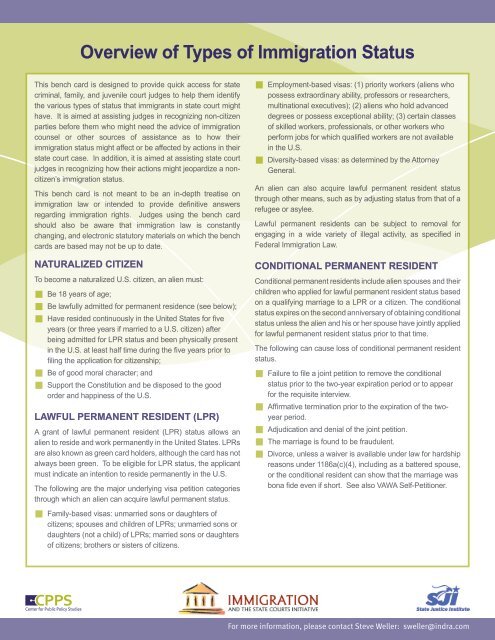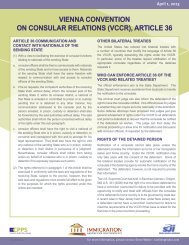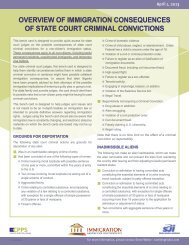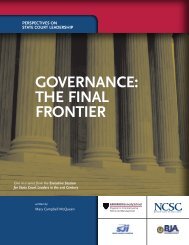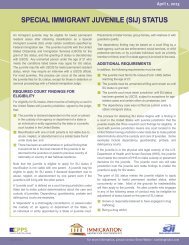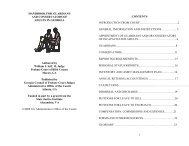Overview of Types of Immigration Status - State Justice Institute
Overview of Types of Immigration Status - State Justice Institute
Overview of Types of Immigration Status - State Justice Institute
You also want an ePaper? Increase the reach of your titles
YUMPU automatically turns print PDFs into web optimized ePapers that Google loves.
DRAFT<br />
<strong>Overview</strong> <strong>of</strong> <strong>Types</strong> <strong>of</strong> <strong>Immigration</strong> <strong>Status</strong><br />
This bench card is designed to provide quick access for state<br />
criminal, family, and juvenile court judges to help them identify<br />
the various types <strong>of</strong> status that immigrants in state court might<br />
have. It is aimed at assisting judges in recognizing non-citizen<br />
parties before them who might need the advice <strong>of</strong> immigration<br />
counsel or other sources <strong>of</strong> assistance as to how their<br />
immigration status might affect or be affected by actions in their<br />
state court case. In addition, it is aimed at assisting state court<br />
judges in recognizing how their actions might jeopardize a noncitizen’s<br />
immigration status.<br />
This bench card is not meant to be an in-depth treatise on<br />
immigration law or intended to provide definitive answers<br />
regarding immigration rights. Judges using the bench card<br />
should also be aware that immigration law is constantly<br />
changing, and electronic statutory materials on which the bench<br />
cards are based may not be up to date.<br />
NATURALIZED CITIZEN<br />
To become a naturalized U.S. citizen, an alien must:<br />
QQ<br />
Be 18 years <strong>of</strong> age;<br />
QQ<br />
Be lawfully admitted for permanent residence (see below);<br />
QQ<br />
Have resided continuously in the United <strong>State</strong>s for five<br />
years (or three years if married to a U.S. citizen) after<br />
being admitted for LPR status and been physically present<br />
in the U.S. at least half time during the five years prior to<br />
filing the application for citizenship;<br />
QQ<br />
Be <strong>of</strong> good moral character; and<br />
QQ<br />
Support the Constitution and be disposed to the good<br />
order and happiness <strong>of</strong> the U.S.<br />
LAWFUL PERMANENT RESIDENT (LPR)<br />
A grant <strong>of</strong> lawful permanent resident (LPR) status allows an<br />
alien to reside and work permanently in the United <strong>State</strong>s. LPRs<br />
are also known as green card holders, although the card has not<br />
always been green. To be eligible for LPR status, the applicant<br />
must indicate an intention to reside permanently in the U.S.<br />
The following are the major underlying visa petition categories<br />
through which an alien can acquire lawful permanent status.<br />
QQ<br />
Family-based visas: unmarried sons or daughters <strong>of</strong><br />
citizens; spouses and children <strong>of</strong> LPRs; unmarried sons or<br />
daughters (not a child) <strong>of</strong> LPRs; married sons or daughters<br />
<strong>of</strong> citizens; brothers or sisters <strong>of</strong> citizens.<br />
QQ<br />
Employment-based visas: (1) priority workers (aliens who<br />
possess extraordinary ability, pr<strong>of</strong>essors or researchers,<br />
multinational executives); (2) aliens who hold advanced<br />
degrees or possess exceptional ability; (3) certain classes<br />
<strong>of</strong> skilled workers, pr<strong>of</strong>essionals, or other workers who<br />
perform jobs for which qualified workers are not available<br />
in the U.S.<br />
QQ<br />
Diversity-based visas: as determined by the Attorney<br />
General.<br />
An alien can also acquire lawful permanent resident status<br />
through other means, such as by adjusting status from that <strong>of</strong> a<br />
refugee or asylee.<br />
Lawful permanent residents can be subject to removal for<br />
engaging in a wide variety <strong>of</strong> illegal activity, as specified in<br />
Federal <strong>Immigration</strong> Law.<br />
CONDITIONAL PERMANENT RESIDENT<br />
Conditional permanent residents include alien spouses and their<br />
children who applied for lawful permanent resident status based<br />
on a qualifying marriage to a LPR or a citizen. The conditional<br />
status expires on the second anniversary <strong>of</strong> obtaining conditional<br />
status unless the alien and his or her spouse have jointly applied<br />
for lawful permanent resident status prior to that time.<br />
The following can cause loss <strong>of</strong> conditional permanent resident<br />
status.<br />
QQ<br />
Failure to file a joint petition to remove the conditional<br />
status prior to the two-year expiration period or to appear<br />
for the requisite interview.<br />
QQ<br />
Affirmative termination prior to the expiration <strong>of</strong> the twoyear<br />
period.<br />
QQ<br />
Adjudication and denial <strong>of</strong> the joint petition.<br />
QQ<br />
The marriage is found to be fraudulent.<br />
QQ<br />
Divorce, unless a waiver is available under law for hardship<br />
reasons under 1186a(c)(4), including as a battered spouse,<br />
or the conditional resident can show that the marriage was<br />
bona fide even if short. See also VAWA Self-Petitioner.<br />
For more information, please contact Steve Weller: sweller@indra.com
DRAFT<br />
May 1, 2012<br />
SUMMARY OF FAMILY-SPONSORED VISAS<br />
Overall, about 80% <strong>of</strong> all legal immigration into the U.S., is<br />
through some type <strong>of</strong> family visa. The following is a summary <strong>of</strong><br />
family visa categories.<br />
Immediate relatives <strong>of</strong> a U.S. Citizen, including an alien spouse,<br />
unmarried minor child, or parent if citizen is 21 or older, are not<br />
subject to numerical limitation. The alien spouse or minor child<br />
will be a conditional immigrant if marriage is entered into less<br />
than 24 months prior to the date that the visa is obtained.<br />
The following family-sponsored visas are subject to numerical<br />
limitations and are given the following orders <strong>of</strong> preference.<br />
Preference Level 1. U.S. Citizen’s alien unmarried son or<br />
daughter not a child.<br />
Preference level 2. Lawful permanent resident’s alien spouse,<br />
unmarried child, or unmarried son or daughter who is not a child.<br />
Preference Level 3. U.S. citizen’s alien married son or<br />
daughter.<br />
Preference level 4. U.S. citizen’s alien brother or sister.<br />
A lawful permanent resident’s alien spouse or unmarried minor<br />
child not otherwise entitled to a visa is entitled to the same status<br />
as the petitioning lawful permanent resident if accompanying or<br />
following to join the spouse or parent.<br />
VAWA SELF-PETITIONER<br />
<strong>Immigration</strong> law provides that an alien married to a citizen or<br />
LPR or a child <strong>of</strong> the alien may self-petition for LPR status<br />
without the cooperation <strong>of</strong> the citizen or LPR spouse or parent if:<br />
QQ<br />
The spouse or child has been battered or subjected to<br />
extreme cruelty by citizen or lawful permanent resident<br />
spouse;<br />
QQ<br />
The act or threatened act was one <strong>of</strong> extreme cruelty,<br />
including physical violence, sexual abuse, forced detention,<br />
or psychological abuse against the petitioner or petitioner’s<br />
child by the spouse during the marriage;<br />
QQ<br />
The marriage is legal and in good faith;<br />
QQ<br />
The petitioner is not the primary perpetrator <strong>of</strong> the violence;<br />
and<br />
QQ<br />
The petitioner is <strong>of</strong> good moral character.<br />
SPECIAL IMMIGRANT JUVENILE STATUS<br />
(SIJS)<br />
A person under the age <strong>of</strong> 21 may apply for Special Immigrant<br />
Juvenile status if he or she meets the following conditions:<br />
QQ<br />
There is a finding by a court in the United <strong>State</strong>s with<br />
juvenile jurisdiction that: (1) the juvenile is dependent<br />
on the court and placed in the custody <strong>of</strong> an agency or<br />
department <strong>of</strong> a state or an individual or entity appointed<br />
by the state or a juvenile court located in the United<br />
<strong>State</strong>s; and (2) reunification <strong>of</strong> the juvenile with one<br />
or both parents is not viable due to abuse, neglect, or<br />
abandonment or a similar basis;<br />
QQ<br />
There is an administrative or judicial finding that it would<br />
not be in the best interest <strong>of</strong> the juvenile to be returned to<br />
the juvenile’s or parent’s previous country <strong>of</strong> nationality or<br />
country <strong>of</strong> last habitual residence;<br />
QQ<br />
The juvenile has concurrently applied for lawful permanent<br />
resident status; and<br />
QQ<br />
The dependency case was not filed as a sham solely to<br />
obtain immigrant status.<br />
The dependency court must retain jurisdiction until the juvenile<br />
is granted SIJS status.<br />
REFUGEE/ASYLEE<br />
The following are the basic conditions for refugee/asylee status.<br />
QQ<br />
The individual has a well-founded fear <strong>of</strong> persecution on<br />
the basis <strong>of</strong> race, religion, nationality, membership in a<br />
particular social group, or political opinion if returned to the<br />
home country or country <strong>of</strong> last permanent residence.<br />
QQ<br />
The individual is not a security risk or perpetrator <strong>of</strong><br />
persecution.<br />
QQ<br />
The individual has not committed certain categories <strong>of</strong><br />
crimes.<br />
A person in the United Sates must generally apply for asylum<br />
within one year <strong>of</strong> admission.<br />
Once admitted the alien will be allowed to stay in the U.S. as<br />
long as expulsion from the U.S. would put them at a safety risk,<br />
unless he or she meets one <strong>of</strong> the grounds for loss <strong>of</strong> status<br />
listed below.<br />
QQ<br />
The individual is able to safely return to the home country
DRAFT<br />
or move to another country.<br />
QQ<br />
The individual no longer meets the requirements <strong>of</strong><br />
eligibility.<br />
QQ<br />
The individual has participated in persecution.<br />
QQ<br />
The individual presents a security risk.<br />
QQ<br />
The individual has been convicted <strong>of</strong> a serious crime,<br />
including conviction <strong>of</strong> an aggravated felony.<br />
A spouse or child <strong>of</strong> an alien admitted as a refugee/asylee is<br />
admissible if “accompanying or following to join” the refugee/<br />
asylee.<br />
QQ<br />
The spouse or child cannot precede the refugee/asylee.<br />
QQ<br />
An alien granted refugee/asylee status may apply for LPR<br />
status after one year.<br />
QQ<br />
The alien must be admissible, or<br />
QQ<br />
The Attorney General may waive the grounds for<br />
inadmissibility, with some exceptions, for humanitarian<br />
purposes or to preserve family unity.<br />
VICTIM OF HUMAN TRAFFICKING<br />
The T visa is available for individuals who have been the victims<br />
<strong>of</strong> human trafficking and meet the following requirements.<br />
QQ<br />
The person is the victim <strong>of</strong> severe trafficking.<br />
QQ<br />
The person is assisting in the investigation or prosecution<br />
<strong>of</strong> traffickers.<br />
Under the Trafficking Victims Protection Act, a person under the<br />
age <strong>of</strong> 18 who is induced to perform a commercial sex act is<br />
considered a victim <strong>of</strong> severe trafficking.<br />
The maximum length <strong>of</strong> stay under the T visa status is four years<br />
unless extended. The holder <strong>of</strong> a T visa is eligible to apply for<br />
lawful permanent resident status if he or she is <strong>of</strong> good moral<br />
character, and has been continuously in the U.S. for three years.<br />
CRIME VICTIM OR WITNESS<br />
The U visa is available to individuals who are in the U.S. as<br />
undocumented aliens but meet the following requirements<br />
QQ<br />
The individual has suffered severe physical or mental<br />
abuse as a result <strong>of</strong> being a victim <strong>of</strong> criminal activity.<br />
QQ<br />
The individual has been, is being, or is likely to be <strong>of</strong> help<br />
to a Federal, state, or local investigation <strong>of</strong> the criminal<br />
activity causing the abuse.<br />
QQ<br />
The individual has certification from a Federal, state, or<br />
local judge, prosecutor, law enforcement <strong>of</strong>ficer, or other<br />
justice system <strong>of</strong>ficial involved in prosecuting the criminal<br />
activity that he or she has been, is being, or is likely to<br />
be <strong>of</strong> help to a Federal, state, or local investigation <strong>of</strong> the<br />
criminal activity causing the abuse.<br />
The rights <strong>of</strong> the U visa holder include the following.<br />
QQ<br />
The maximum length <strong>of</strong> the U visa is four years unless<br />
extended.<br />
QQ<br />
The U visa holder may apply for any other immigration<br />
benefit or status for which he or she is eligible.<br />
QQ<br />
The holder <strong>of</strong> a U visa is eligible to apply for lawful<br />
permanent resident status with three years <strong>of</strong> continuous<br />
residence.<br />
NON-IMMIGRANT TEMPORARY VISAS<br />
The law provides for a variety <strong>of</strong> categories <strong>of</strong> aliens that<br />
are eligible for visas to legally enter the United <strong>State</strong>s on a<br />
temporary basis for a limited period <strong>of</strong> time. These visa holders<br />
are classified as non-immigrants under Federal immigration law.<br />
Eligible aliens include vacationers, students, certain classes <strong>of</strong><br />
temporary workers, and a variety <strong>of</strong> specialized categories. The<br />
authorized length <strong>of</strong> stay is specified in the visa. The alien may<br />
have to take certain actions to maintain the status.<br />
For more information, please contact Steve Weller: sweller@indra.com
DRAFT


